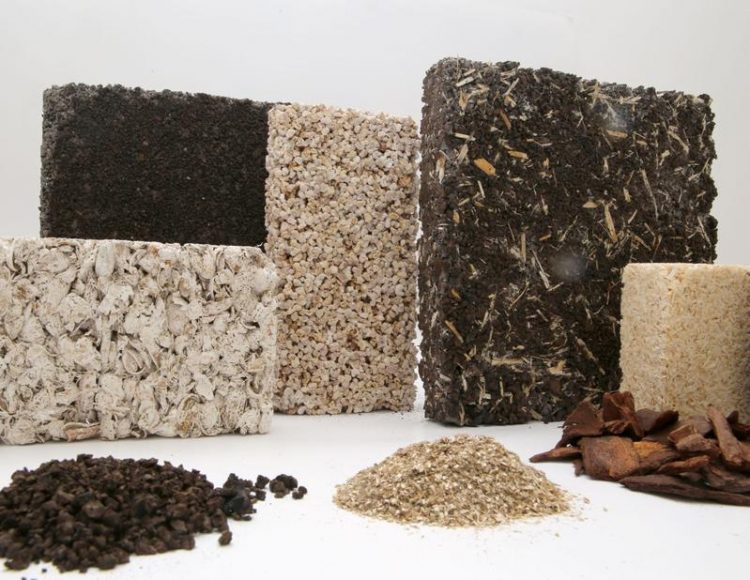OrganoPor: Bio-Based Boards for A Thermal Insulation Composite System

A novel facade insulation material made of residual and waste materials from agriculture and forestry have what it takes to conquer the market. Photo: Fraunhofer LBF
Polystyrene foam boards (PS) are the most common insulation material, used in more than 90% of all thermal insulation composite systems (TICS). There have been hardly any bio-based alternatives, as they are associated with manageability and price issues.
The Fraunhofer LBF’s project developed a competitive, bio-based hybrid material for PS boards which are also price-competitive — a pioneering achievement.
These use residual and waste materials such as cork and corncobs, waterborne resins based on lignin, and mineral fillers as flame retardants. To manufacture the panels, the porous particles of renewable raw materials are coated with a bio-based duromer, that includes a mineral flame retardant, and are then pressed.
The benefit: This is not a new manufacturing process. An existing, marketable principle can be used without a great deal of effort.
The resulting boards behave in fires in the same way as the latest-generation polystyrene foam hybrid materials. Component densities of 120 kg/m³ and thermal conductivities of 40 mW/m K have been achieved. Its open-pored structure provides control of water vapor diffusion. Applications tests performed by DAW, its industrial partner, have shown that OrganoPor can be easily used in TICSs.
OrganoPor is particularly economical to produce, due to the structural and processing parallels to polystyrene foam hybrid materials. An additional benefit is the availability of raw materials. OrganoPor has a great opportunity to establish itself as an ecological alternative in the insulation material market.
The German Federal Ministry of Food and Agriculture (BMEL) supported the “Insulation Materials for Building Insulation from Biogenic Residues with Spherical, Porous Structure and Fire-Retardant Bioresin Matrices” project via the Agency for Renewable Raw Materials (FNR). Project partners included JOMA Dämmstoffwerk GmbH, J. Rettenmaier & Söhne GmbH + Co KG, Nabaltec and DAW SE (Deutsche Amphibolin-Werke).
The final report is available at fnr.de under the funding ID 22023516.
The organopor.com website provides basic information about the project history and properties of OrganoPor materials.
Dr. Roland Klein, roland.klein@lbf.fraunhofer.de
https://www.fnr.de/index.php?id=11150&fkz=22023516
http://www.organopor.com (Website)
Media Contact
All latest news from the category: Materials Sciences
Materials management deals with the research, development, manufacturing and processing of raw and industrial materials. Key aspects here are biological and medical issues, which play an increasingly important role in this field.
innovations-report offers in-depth articles related to the development and application of materials and the structure and properties of new materials.
Newest articles

New organoid with all key pancreas cells
Researchers from the Organoid group (previously Clevers group) at the Hubrecht Institute have developed a new organoid that mimics the human fetal pancreas, offering a clearer view of its early development….

Unlocking the potential of nickel
New study reveals how to use single atoms to turn CO2 into valuable chemical resources. Nickel and nitrogen co-doped carbon (Ni-N-C) catalysts have shown exceptional performance in converting CO2 into…

‘Spooky action’ at a very short distance
Scientists map out quantum entanglement in protons. Particles streaming from collisions offer insight into dynamic interactions and collective behavior of quarks and gluons. Scientists at the U.S. Department of Energy’s…



